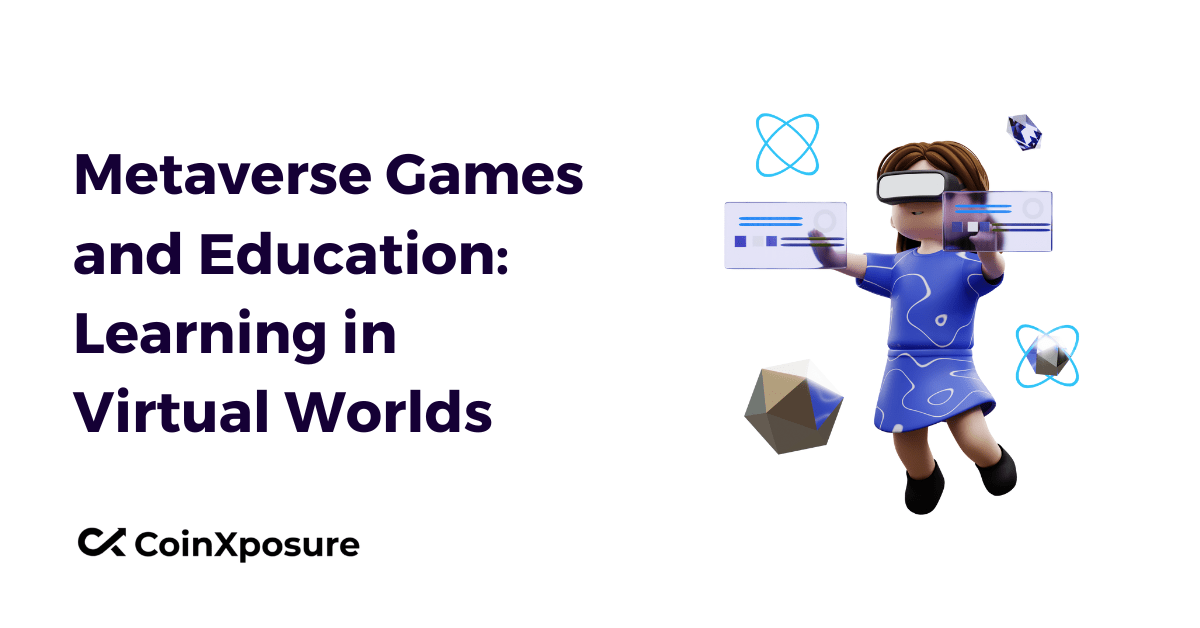
Metaverse Games and Education – Learning in Virtual Worlds
In the ever-evolving landscape of education, integrating metaverse games offers a transformative approach to learning, propelling education into virtual realms.
The metaverse, a collective virtual shared space, becomes a dynamic arena where games and education converge, creating immersive and engaging learning experiences.
This article explores the symbiotic relationship between metaverse games and education, delving into the potential benefits, challenges, and future of learning within these captivating virtual worlds.
Metaverse Games in Education
Metaverse games in education represent a groundbreaking fusion of virtual reality and learning, ushering in a new era of interactive and engaging educational experiences.
These games leverage the immersive nature of the metaverse, offering students opportunities to explore subjects through simulated environments, hands-on activities, and gamified learning modules.
From practical skill development to gamified lessons enhancing student motivation, incorporating metaverse games into education aims to revolutionize traditional teaching methods, making learning informative and an adventure within the limitless possibilities of virtual worlds.
Benefits of Metaverse Games in Education
The integration of metaverse games in education brings forth a myriad of benefits that transcend traditional learning boundaries. These include:
- Increased Engagement
- Real-world Application
- Global Collaboration
- Gamification for Motivation
- Enhanced Creativity
Increased Engagement
Metaverse games captivate students with interactive and dynamic content, catering to diverse learning styles and fostering a higher level of engagement.
Real-world Application
Virtual simulations provide a safe yet realistic environment for students to apply theoretical knowledge, bridging the gap between classroom learning and practical skills development.
Global Collaboration
Metaverse platforms enable students worldwide to connect in shared virtual spaces, promoting cross-cultural collaboration and understanding.
Gamification for Motivation
The incorporation of game elements, such as points, rewards, and progression, motivates learners, making the educational experience more enjoyable and stimulating.
Enhanced Creativity
Virtual worlds encourage creative thinking and problem-solving, allowing students to explore concepts imaginatively that may not be feasible in a traditional classroom setting.
By leveraging these benefits, metaverse games in education hold the potential to revolutionize the learning experience, making it more engaging, interactive, and aligned with the evolving needs of 21st-century learners.
Challenges and Considerations of Metaverse Games in Education
Despite the promising potential, the integration of metaverse games in education comes with various challenges and considerations:
- Technical Barriers
- Ethical Concerns
- Learning Curve
- Content Integration
Technical Barriers
Access to virtual reality (VR) equipment can be limited, posing challenges for schools and students with constrained resources.
Additionally, ensuring a stable internet connection for seamless experiences is crucial but may be hindered by bandwidth limitations.
Ethical Concerns
Balancing screen time with traditional education methods is essential to prevent overreliance on virtual environments. Privacy and security concerns within virtual learning spaces must also be addressed to maintain a safe educational environment.
Learning Curve
Both educators and students may face a learning curve when adapting to metaverse technologies. Training and support are necessary to facilitate a smooth transition and ensure effective utilization of virtual tools.
Content Integration
Aligning metaverse games with traditional curricula can be challenging. Ensuring that the content is relevant, age-appropriate, and meets educational standards is crucial for successful integration into existing educational frameworks.
Acknowledging and addressing these challenges is crucial for successfully integrating metaverse games into education, ensuring that the benefits are maximized while mitigating potential drawbacks.
Future Trends and Possibilities of Metaverse Games in Education
Several future trends and possibilities are poised to shape the intersection of metaverse games and education:
- Advancements in Virtual Reality (VR)
- Emergence of Augmented Reality (AR)
- Specialized Educational Metaverse Platforms
- Integration with Artificial Intelligence (AI)
- Expanded Curriculum Integration
Advancements in Virtual Reality (VR)
Anticipate continuous improvements in VR technology, enhancing the realism and immersion of metaverse experiences. This progress will likely contribute to more seamless and sophisticated educational applications.
Emergence of Augmented Reality (AR)
As AR technologies evolve, expect educational metaverse experiences to incorporate augmented elements into physical spaces, blurring the lines between the virtual and real-world learning environments.
Specialized Educational Metaverse Platforms
Anticipate the growth of dedicated platforms designed specifically for educational purposes. These platforms may offer curated content, collaboration tools, and features tailored to the unique needs of educators and students.
Integration with Artificial Intelligence (AI)
AI-powered elements within metaverse games could provide personalized learning experiences, adapting content based on individual student progress and preferences, further enhancing the effectiveness of educational interactions.
Expanded Curriculum Integration
As metaverse games become more sophisticated, anticipate their integration into a broader range of academic subjects. Virtual worlds may become integral components of diverse curricula from language learning to STEM education.
As these trends unfold, the future of metaverse games in education holds exciting possibilities for redefining how students learn and engage with educational content in increasingly dynamic and immersive ways.
Conclusion
The integration of metaverse games into education marks a transformative journey towards dynamic, immersive, and engaging learning experiences.
The benefits, including increased engagement, real-world application, and global collaboration, underscore the potential of these virtual environments to reshape traditional educational paradigms.
However, challenges such as technical barriers, ethical considerations, and the need for content integration must be navigated thoughtfully.
Overcoming these hurdles is essential to ensure the responsible and effective utilization of metaverse games as powerful educational tools.
As we embark on this metaverse-infused educational journey, it is crucial to balance innovation and thoughtful consideration of the challenges at hand.
By doing so, we pave the way for a future where metaverse games play a pivotal role in shaping the next generation of learners, fostering creativity, collaboration, and a deep-seated love for pursuing knowledge within virtual worlds.
